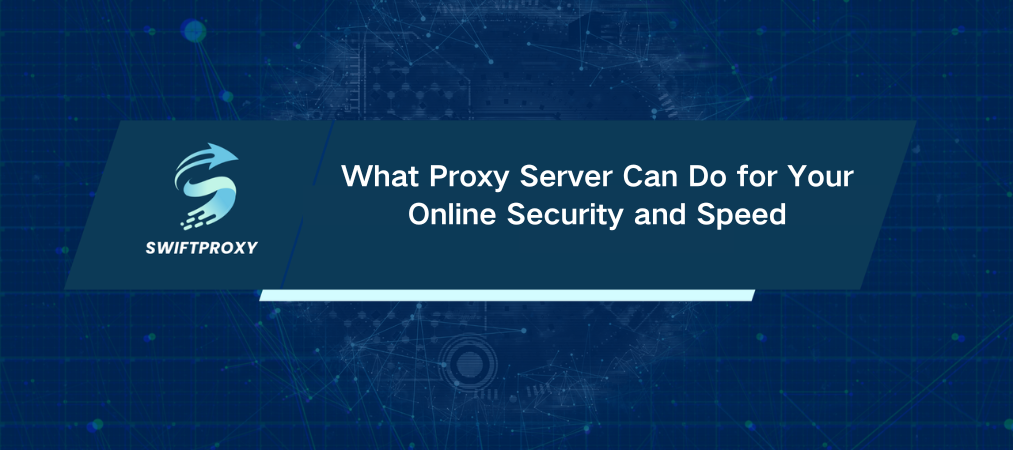What Proxy Server Can Do for Your Online Security and Speed

If you're new to the internet's invisible architecture, a proxy server might seem like one of those abstract tech concepts. But understanding it is a game-changer, especially when it comes to security and privacy. A proxy server is, essentially, a gatekeeper between you and the internet. It helps secure your data, boost your browsing speed, and even hide your identity online. But let's break it down.
What Exactly is a Proxy Server
Think of a proxy server as a middleman between your device and the websites you want to visit. Here's how it works:
You ask for something online (say, a website).
Instead of going directly to the website, your request first lands at the proxy server.
The proxy makes the request to the website, retrieves the data, and sends it back to you.
In simpler terms, it's like sending a letter to a post office (the proxy), and the post office takes care of delivering it to the right address. You never interact directly with the final destination—it's all handled by the proxy server.
For beginners, this idea might feel abstract, but it becomes clearer when you realize that proxies help with a lot of essential tasks like filtering content, improving speed, and protecting your privacy.
Why Should You Care About Proxy Server
Boosting Security
One of the standout features of a proxy server is its ability to increase your security online. Think of it as a protective barrier between your device and the internet. It can block access to malicious websites, guard against malware, and stop phishing attacks before they even reach you.
Moreover, proxies can encrypt the data traveling between you and the proxy server. This means that your sensitive information—whether it's login details or personal data—can't be intercepted by prying eyes.
Keeping You Anonymous
Privacy is king in today's digital world. When you use a proxy, the websites you visit only see the proxy's IP address, not yours. It's like wearing a cloak of invisibility online.
This anonymity can be crucial for those times when you don't want your browsing habits tracked. It's also handy for accessing content that's restricted by region. Want to watch a show available only in another country? A proxy server can make you look like you're browsing from that region.
Speeding Things Up
Ever been frustrated by a slow-loading website? Proxies can help speed up your browsing experience. By caching data from websites you visit frequently, a proxy can serve that cached data the next time you visit, rather than fetching it from scratch. This cuts down load times and reduces network congestion, making your browsing faster and more efficient.
For businesses, this means reduced bandwidth costs and better productivity, as employees can access frequently-used content without long delays.
Types of Proxy Servers
Proxies come in different shapes and sizes. Understanding which one is right for your needs is key.
Forward Proxy
This is the most common type. It sits between the client (you) and the internet, handling all your requests before sending them out. It's typically used in businesses to control and monitor internet usage, ensuring employees access appropriate websites.
Reverse Proxy
Unlike a forward proxy, a reverse proxy is used by websites to manage incoming traffic. It's like a traffic controller, distributing user requests to the right web server. Reverse proxies are great for improving website performance and load balancing, ensuring that a surge in visitors doesn't slow down the site.
Transparent Proxy
A transparent proxy doesn't alter or filter any requests. It's essentially invisible to the user, simply forwarding traffic without changing anything. Transparent proxies are often used for caching or monitoring internet usage without interfering with the data flow.
Real-World Use Cases of Proxy Servers
Seeing how proxy servers are used in the real world can make them feel less abstract and more practical.
Corporate Security
For businesses, proxy servers are vital tools. They act as a gatekeeper, preventing access to malicious sites and helping to enforce internet usage policies. By monitoring employee internet traffic, companies can ensure that sensitive information stays secure and that employees stay focused on their tasks.
Bypassing Geo-Restrictions
Streaming services and websites often block content based on location. Want to watch a video only available in a different country? A proxy server can make it look like you're browsing from that country, letting you bypass these restrictions with ease.
Managing Bandwidth
Proxies are also used by businesses and ISPs to optimize network performance. By caching commonly accessed data, proxies reduce the need to repeatedly download the same content, saving bandwidth and speeding up the internet connection for everyone.
Common Pitfalls to Avoid
While proxies offer many benefits, they aren't without their challenges.
Speed Issues: If too many people use the same proxy or it's poorly configured, you might experience slowdowns. The key is choosing a reliable proxy and making sure it's properly set up.
Security Risks: Misconfigured proxies can introduce security vulnerabilities. Make sure your proxy settings are correct to avoid any unintended exposure.
Conclusion
At the end of the day, proxy servers are essential tools for anyone looking to improve their online security, privacy, and browsing experience. By acting as an intermediary, proxies help protect your data, boost speed, and maintain anonymity. Whether you're a business looking to optimize your network or an individual concerned about privacy, proxies provide a simple, effective solution.
For beginners, grasping the core functions of proxies opens the door to a better, safer internet experience. And with the different types of proxies available, there's always a solution that fits your needs. So, next time you browse, think about the invisible middleman making your internet experience faster, safer, and more private.

















































